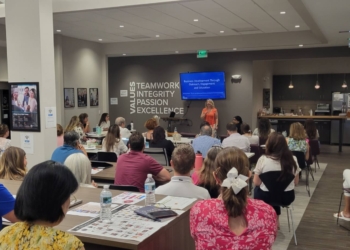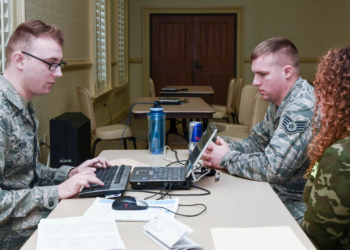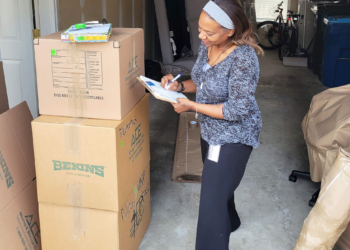With four associate degrees, a bachelor’s degree and a master’s degree on his resume, Air Force Reserve Lt. Tyler Trease is equal parts student veteran and veteran student. Trease’s next education milestone is a Family Nurse Practitioner Post-Master’s Certificate from the University of Cincinnati Online.
Trease, who could be a poster child for maximizing G.I. Bill benefits, is among a growing number of student veterans choosing to continue their higher education at the University of Cincinnati (UC). UC’s 46,798-person student body includes nearly 1,000 military-affiliated students.
Since the Post-9/11 G.I. Bill was enacted in 2008, nearly 800,000 veterans and eligible family members have received education benefits. To be eligible for Post-9/11 GI Bill (Chapter 33) Bill https://www.va.gov/education/about-gi-bill-benefits/post-9-11/ benefits, service members must:
- Serve at least 90 days on active duty on or after Sept. 11, 2001, or
- Receive a Purple Heart on or after Sept. 11, 2001, and be honorably discharged after any amount of service, or
- Serve for at least 30 continuous days and be honorably discharged with a service-connected disability, or
- Be a spouse or dependent child using transferred benefits
Veterans qualifying for the maximum benefit will receive up to 36 months of tuition and fees at in-state public institutions and up to $25,162 per year at private and foreign schools. Students also may be eligible for a location-based housing allowance and annual $1,000 book stipend. In addition, some universities, such as UC, participate in the Yellow Ribbon Program, which helps pay for out-of-state, private or graduate school tuition not covered by the Post-9/11 GI Bill.
At UC, student veterans have access to VetSuccess on Campus, a Department of Veterans Affairs (VA) outreach program available only on 94 campuses nationwide.
“It’s a rare program to have,” VetSuccess Counselor Jill Cochran explained. “It’s a one-stop shop for VA assistance. Veterans can come to us face-to-face with any questions, concerns or guidance on how to use education benefits or anything VA-related.”
Vice Provost and Dean of UC Online, Jason Lemon, PhD, maintains veterans using Post-9/11 GI Bill benefits should consider online education, which can allow them to remain rooted to where they live and work while obtaining a quality education.
“If a student has a job, if a student has a family, if a student has responsibilities that tie them to a specific place, then online is the [best] option they’ve got to continue to get the education they need to advance,” Lemon said.
Trease, a Toledo firefighter/paramedic and registered nurse, is considering returning to active duty after completing his nurse practitioner certification at UC Online. But he points out his advancement from firefighter to nurse practitioner would not have happened without online higher education.
“Online schooling offered me a lot of benefits,” said Trease, who used a portion of his Post-9/11 GI Bill to earn a master’s degree in nursing education while deployed to Kuwait. “I look at where I’m sitting now professionally. Wow. I wouldn’t have been able to do this if I had to have attended everything in person.”
At UC, online education is not a new phenomenon.
“Online instruction requires years of development and dedication. University of Cincinnati has been doing this for over 20 years,” said Lemon, who draws a distinction between remote instruction taking place due to the COVID-19 pandemic and purpose-built online education. “It’s clear what works and what doesn’t work. There are specific strategies, specific software tools, specific components, ideas, types of assignments that work better than others. That takes time to discover.”
When using the Post-9/11 GI Bill, Montgomery GI Bill or other education benefits, Cochran advises veterans to “over communicate” with their school’s veterans office if they have concerns regarding course scheduling, payments or other issues that could affect their funding.
“Don’t hesitate to ask questions. Don’t take it for granted or assume. Definitely ask is this going to affect my VA benefits?” she said.
In addition to staying on top of certification filing deadlines, Cochran suggests student veterans maintain a financial cushion. Not only are housing stipends paid in arrears, but other VA payments may take time to arrive.
“The VA can be a late payer,” she said. “Have a backup plan just in case. Changes happen. Issues happen when you’re counting on that money.”







































